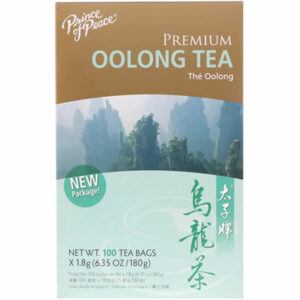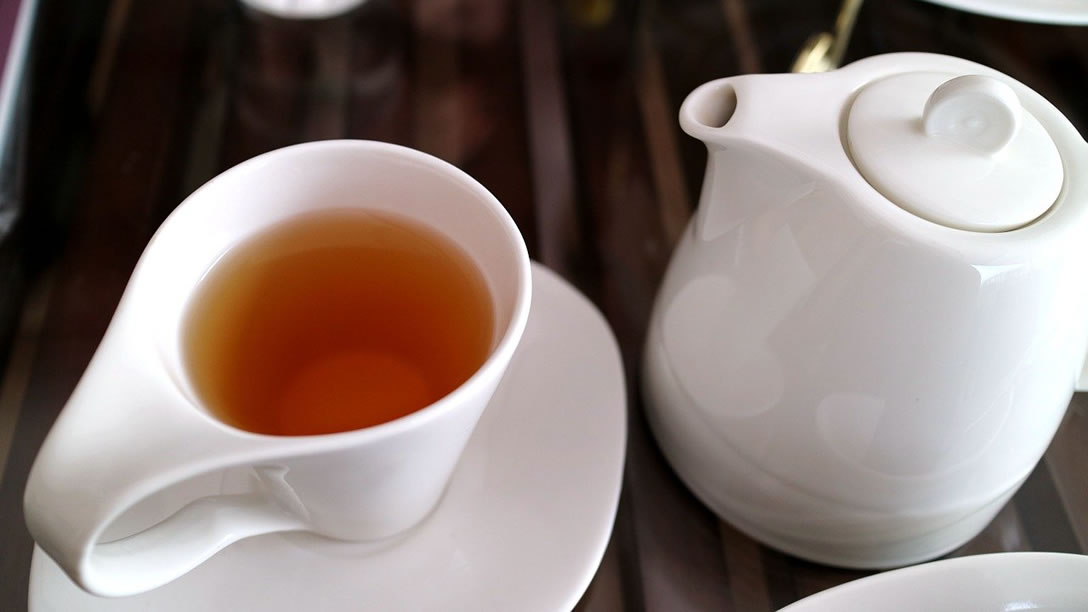Uses of oolong tea
Oolong tea, like black tea and green tea, is made from the leaves, buds, and stems of the tea tree.
The difference lies in the fermentation process: oolong tea is semi-fermented, black tea is fully fermented, and green tea is not fermented.
What are the benefits of drinking oolong tea?
- Strengthens the immune system
- Strengthen thoughts and brain sensitivity
- Prevent cancer, tooth decay, Osteoporosis, Heart diseases.
- Treatment of obesity, Diabetes, Atherosclerosis, High cholesterol, skin allergies (such as Eczema).
What is the function of oolong tea?
There is not enough research to prove the efficacy of oolong tea.
However, it is now generally determined that oolong tea contains caffeine, which can stimulate the central nervous system, heart, and muscles.
In addition, oolong tea also contains theophylline and theobromine, both chemicals are very similar to caffeine.
Precautions
If the following conditions are met, please consult a physician or pharmacist before using oolong tea:
- During pregnancy or breastfeeding, and taking medication prescribed by a physician.
- Are taking drugs bought in the shop
- Suffering from other diseases or any special physical condition.
- Allergic to oolong tea, or any medicines, herbs.
- There are other allergies, including food, artificial colors, food preservatives, animals, etc.
Compared with the specifications of medicines, the relevant regulations of herbal nutrition are less strict.
At present, more research is needed to prove the safety of herbal nutrition. Therefore, before using oolong tea, please discuss with your doctor to confirm that the benefits outweigh the risks.
Is it safe to use oolong tea?
Drinking too much oolong tea (more than 5 cups a day) will cause side effects due to too much coffee.
Ethnic groups to watch out for
- Women who are pregnant or breastfeeding: Using a small amount of oolong tea should be safe and harmless, and should not exceed 2 cups a day, because oolong tea contains 200 mg of caffeine. Ingesting too much caffeine during pregnancy may cause premature birth and newborns Low body weight or harm to the fetus.
- Ingesting too much caffeine during breastfeeding may cause irritation to the baby or increase gastrointestinal motility.
- Children: The caffeine content in general foods is almost safe for children.
- Anxiety sufferers: The caffeine in oolong tea may worsen Anxiety.
- People with abnormal bleeding: Studies have found that caffeine may slow the rate of blood clotting. Although there are no human experiments, it is still necessary to be careful about the risk that caffeine will make bleeding conditions worse.
- Heart disease patients: Oolong tea contains caffeine, which may cause arrhythmia.
- Diabetics: Studies have found that caffeine may affect the way diabetics handle sugar, making blood sugar more difficult to control. However, some studies have shown that caffeine may make the precursors of type 1 diabetes obvious, so it is easier to detect diabetes and treat hypoglycemia. The disadvantage is that caffeine may increase the number of episodes of hypoglycemia, so diabetic patients should consult a physician before using oolong tea.
- Patients with easy diarrhea: Oolong tea contains caffeine, which may exacerbate diarrhea and Irritable bowel syndrome if ingested in large amounts.
- Glaucoma patients: Oolong tea contains caffeine, which raises intraocular pressure within 30 minutes and lasts for at least 90 minutes.
- Hypertensive patients: The caffeine of oolong tea may increase the blood pressure of hypertensive patients, but similar situations will not occur in ordinary people who often drink tea or other caffeinated beverages.
- Osteoporosis patients: Drinking oolong tea may cause calcium to be excreted together during urination, affecting bone health. Therefore, Osteoporosis patients should not drink more than 3 cups of oolong tea a day and may consider taking calcium supplements to make up the excreted calcium. If you also have vitamin D related genetic diseases, please consult your physician before ingesting caffeine.
Potential side effects of using oolong tea
Drinking oolong tea may cause mild to severe side effects, including headache, nervousness, trouble sleeping, vomiting, diarrhea, irritability, arrhythmia, trembling, heartburn, dizziness, tinnitus, convulsions, confusion.
Not everyone will have side effects, and may also have other side effects not listed above. If you have any doubts, please consult your doctor.
Potential interactions with oolong tea
Oolong tea may interact with the drugs you are taking or your own disease. Please check with your doctor before taking it. Drugs that may interact with the caffeine in oolong tea include:
- Stimulant drugs: Stimulant drugs like Cocaine, Amphetamines, Nicotine, Ephesine will speed up the operation of the nervous system, making the nerves tight and heartbeat faster. The caffeine contained in oolong tea also has the same effect, so if it is used with stimulant drugs at the same time, it may cause very serious consequences, such as rapid heartbeat and high blood pressure.
- Cardiac stress test drugs: You need to use some drugs during the heart stress test t), and the caffeine contained in oolong tea may reduce the efficacy of some drugs, so do not use oolong tea or 24 hours before the test Other products containing caffeine. Test drugs that can be affected by caffeine are Adenosine and Dipyridamole.
- Diabetes drugs: The function of diabetes drugs is to lower blood sugar, and oolong tea may increase blood pressure, thus reducing the efficacy of diabetes drugs. When using oolong tea together with diabetes drugs, please closely monitor blood sugar, the dosage of diabetes drugs may also need to be changed. Diabetes drugs include Glimepiride, Glyburide, Insulin, Pioglitazone, Rosiglitazone, Chlorpropamide, Glipizide, Tolbutamide, etc.
- Medicines that reduce the rate of caffeine breakdown: Some medicines reduce the rate at which the body naturally decomposes caffeine. Co-administration with oolong tea may increase the risk of caffeine side effects, such as throbbing, headache, and rapid heartbeat. If you are using these Drugs, please reduce your caffeine intake, for example:
- Antibiotics/Quinolone antibiotics: Ciprofloxacin, Enoxacin, Norfloxacin, Sparfloxacin, Trovafloxacin, Grepafloxacin.
- Estrogens: Conjugated equine estrogens, Ethinyl estradiol, Estradiol, etc.
- Birth control pills: ethinylestradiol and Levonorgestrel, ethinylestradiol, and Norethindrone.
- Other drugs: Cimetidine, Disulfiram, Fluconazole, Fluvoxamine, Mexiletine, Terbinafine, Verapamil, and alcohol.
- Drugs that slow down the rate of decomposition due to the influence of caffeine: The caffeine contained in oolong tea may reduce the rate at which the body breaks down certain drugs. The simultaneous use of both may increase the risk of side effects of the drugs. These drugs include Clozapine and Riluzole.
- Anti-depressant drugs: Depressive drugs and caffeine contained in oolong tea both stimulate the body. If used together, it may cause severe side effects due to excessive stimulation, such as rapid heartbeat, high blood pressure, and tension. Depressive drugs include Phenelzine, Tranylcypromine, etc.
- Anticoagulant/antiplatelet drugs: The caffeine contained in oolong tea may reduce the speed of blood clotting. Simultaneous use with oolong tea will slow down the efficacy of the drug and increase the chance of bruising and bleeding. Drugs that slow blood clotting include: Aspirin, Clopidogrel, Diclofenac, Ibuprofen, Naproxen, Dalteparin, Enoxaparin, Heparin, Warfarin, etc.
- Pentobarbital: Oolong tea contains caffeine, and its stimulant effect will reduce pentobarbital’s ability to produce drowsiness.
- Lithium: The human body will naturally discharge lithium, but the caffeine contained in oolong tea will increase the rate at which the body discharges lithium. If you are using lithium and oolong tea at the same time, please slowly reduce the amount of caffeine products. Stopping oolong tea too soon may increase the side effects of lithium.
- Theophylline: In addition to the caffeine contained in oolong tea, it slows the body’s rate of theophylline excretion. Caffeine also functions similarly to theophylline. Taking them together may increase the effects and side effects of theophylline.
- Phenylpropanolamine: Phenylpropanolamine-containing medicines and caffeine are as irritating. Simultaneous use with oolong tea may cause excessive stimulation, which may cause high blood pressure, rapid heartbeat, and nervousness.
The recommended dosage of oolong tea
This article does not represent any medical advice, please consult your physician before using oolong tea.
What is the general dosage of oolong tea?
The consumption of oolong tea varies, usually 1 to 10 cups per day. If it is used to improve headaches and improve energy, the average person can consume up to 250 mg of caffeine per day, which is equivalent to 5 cups of oolong tea.
The recommended dosage of oolong tea varies from person to person, depending on other factors such as age and health. Oolong tea-related nutrients are not all safe, please consult a physician for the appropriate dosage.
Types of finished products of oolong tea
Tea leaves, tea pills (Tea pills, will be matched with other herbs), tea extract, tea powder.
Where can I buy the best oolong tea?
In recent years, food safety problems in various countries have exploded, and it is not healthy but black-hearted products that everyone spends on. Therefore, European and American products with relatively strict quality control have become popular products.
And iHerb.com is a large-scale medical cosmetics e-commerce company in the United States. It has a high satisfaction rate of 97% in the evaluation of Google customers. It provides global home delivery so that you can buy it without risking buying fakes through purchasing high-quality health products.

